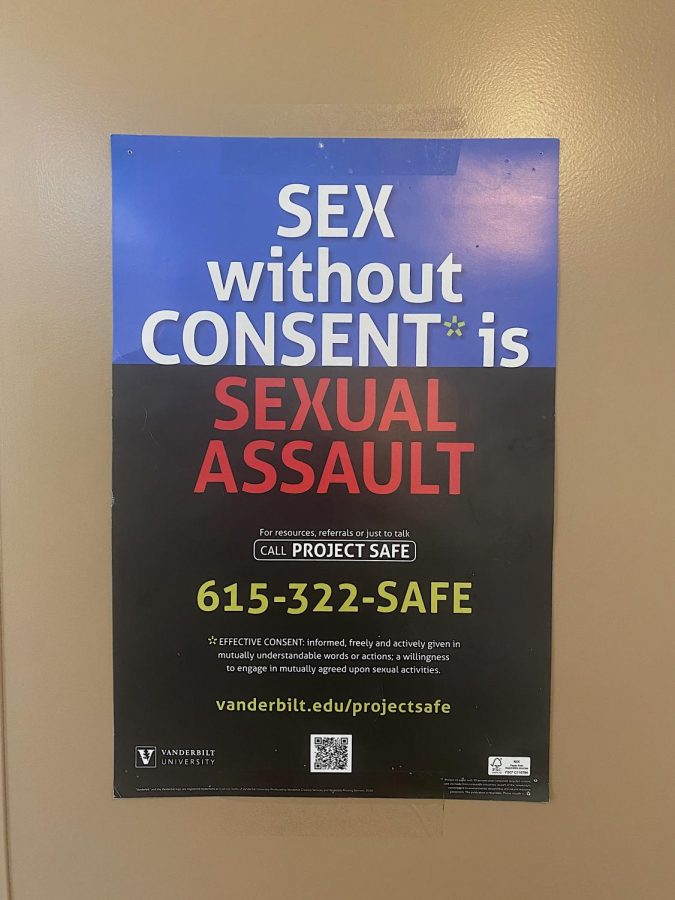Editor’s Note: None of Veronica Norris’ comments are intended as legal advice, nor commentary on the facts of any particular court case, as she is not the attorney of the case at issue in the article. Avery Muir, Dallas Shatel and Sam Zern contributed to this report
*Names have been changed
Content warning: sexual assault
Vanderbilt is a party in a legal battle with a former student who was expelled in 2016, three days before his graduation, on allegations of sexual assault. Sam*, who was a member of ROTC and retroactively lost his scholarship, now owes Vanderbilt an estimated $218,000 in tuition, according to a complaint that he filed in March.
Sam filed a lawsuit claiming that he was denied a meaningful standard of due process and equal protection, and that Vanderbilt questioned his credibility during the investigation based on his gender. He first filed a complaint asking for $10 million in damages in state court during May 2017, but the suit was removed to federal court in June 2017, according to court records.
In February 2018, Chief District Judge Waverly D. Crenshaw, Jr.–the judge assigned to the case–asked Sam to amend his complaint to address the judge’s decision in the sexual assault case Doe v. Miami University, issued by the U.S. Sixth Circuit Court of Appeals. Tennessee is one of the four states that are within the sixth judicial circuit.
The student and his lawyer filed the amended complaint, which increased the claim to $25 million, on March 9, 2018. On March 30, Vanderbilt filed a motion to dismiss this amended complaint and a memorandum in support of the motion.
“We would like to resolve the case short of a trial, but if we have to go to court we are willing to do that,” said Rob McKinney, Sam’s attorney.
What happened?
According to his complaint, Sam was at a St. Patrick’s Day tailgate at an on-campus fraternity on March 19, 2016 when he crossed paths with Sarah*. The two returned to Sam’s Vanderbilt dorm room and engaged in “consensual kissing and petting.” When Sam asked Sarah if she wanted to engage in sexual intercourse, Sarah said no, saying that she was too drunk and that she and Sam didn’t know each other well enough. When Sarah asked Sam if he knew her name, he responded with a “close version of her name,” at which point Sarah became upset, the complaint said.
[infogram id=”5a08d27c-2e1d-4fb2-864b-4a787a86573b” prefix=”yn6″ format=”interactive” title=”Vanderbilt Case”]
Sam and Sarah have different accounts of what happened next.
Sam claims that he reached to the back of Sarah’s neck to gently sit her back down on the bed, when he “inadvertently and non-maliciously” touched the side and/or front of her neck. He claims that Sarah began to have a panic attack, informing Sam that she was triggered by “unpleasant memories of a past encounter that involved the individual’s hands being around her throat.” At this point, Sam says he “ceased physical contact with Sarah except for that he held her shoulders in an effort to console and calm her down so her breathing would return to normal.” Sam also states that he suggested that Sarah wait to leave until her breathing returned to normal, claiming he felt “helpless and unsure of how to act in this type of situation.”
Vanderbilt’s pleadings include a written statement by Sarah, which consists of the following:
“When I told him that I did not want to have sex with him, he became very angry and frustrated. He proceeded to try to convince me to hook up and forcibly groped me. When I got mad he tried to choke me by grabbing my neck and cutting off my air. At this point I threw him off and tried to get dressed to leave. He realized I was hysterical and wouldn’t let me leave until I calmed down. I was drunk at the time and so was the guy so my memory is spotty.”
Following the incident, Vanderbilt asserts that Sarah was seen on surveillance video exiting the building, at which point she went back to her dorm room and took a shower. According to the complaint, Sarah called out for her roommate, referred to as Student 1 in the court documents, while in the shower because she was having another panic attack.
“At this time, Sarah said to Student 1, ‘He choked me,’” the complaint reads. “Student 1 then pressed Sarah for details of what happened, which Sarah refused to give.”
According to Vanderbilt’s filings, Student 1 continued to press Sarah to tell her more details of what happened the next day. The filings state that Sarah eventually obliged and told her roommate that “her throat was hurting her and she started noticing bruising on her breasts and neck area,” at which point Student 1 encouraged her to get checked out at Vanderbilt University Medical Center, which she did.
Vanderbilt asserts that the Medical Center staff notified Vanderbilt Police, who produced a report of Sarah’s situation after she was treated at the hospital. It was at this time that Sarah provided a statement and filed a formal charge with Vanderbilt’s disciplinary system, accusing Sam of sexual assault. VUPD didn’t refer the charge to Metro Nashville police, both at their own discretion and at the request of Sarah. No criminal charges have been brought against Sam.
The following day, when the Equal Opportunity, Affirmative Action, and Disability Services Department (EAD) reached out to Sarah requesting a meeting, she responded that she wasn’t interested in being involved, but gave permission for the EAD to use her police statement, medical records and photo evidence in their investigation, according to the complaint.
Sam and Sarah disagree as to whether Sam attempted to penetrate Sarah during their interaction on March 19. According to Vanderbilt’s filings, the social worker who talked to Sarah in the hospital reported that Sam “attempted to penetrate” Sarah. However, while Sarah’s nurse examined her thighs and found “tiny pinpoint bruises,” she didn’t think that they were related to the incident.
Throughout the EAD investigation, Vanderbilt and Sam agree that Sarah provided new information about the events. Three weeks after the incident, the report says, Sarah said that after she refused to have sex with Sam, he began to “grab her breasts with an excessive amount of force and that she told him to stop.” At one point, Sarah reported, Sam was on top of her and said “you know I want to have sex with you,” and ripped off her underwear and threw it across the room, despite her attempts to hold onto it. She said that Sam attempted to push open her legs, and that she had her hand “barricading her crotch so that he could not penetrate her,” and Sam attempted to hold her down by grabbing the front of her neck, restricting her breathing. But she said she was able to escape his grip and begin looking for her clothes, at which point she began to panic.
Vanderbilt’s filings say that the EAD spoke with Sam twice and issued a Preliminary Investigative Report on April 27, 2016, and a Final Investigative Report on May 9, 2016, days before Sam’s scheduled commencement on May 13, 2016. In this final report, Vanderbilt said, the EAD determined that Sarah was more credible because her statements were consistent, while Sam remained unsure about whether Sarah’s clothing was removed and where he put his hands on her neck. The EAD found that Sam engaged in “contact of a sexual nature without effective consent, used physical force against Sarah during the encounter, and attempted to engage in non-consensual sexual intercourse with Sarah.” The EAD’s determination put him in violation of three offenses listed in Vanderbilt’s Sexual Misconduct Policy: non-consensual sexual contact, dating violence, and attempted sexual intercourse.” As a result, Sam was expelled from the university.
Sam appealed the decision on May 18, 2016. On June 3, 2016, Director of Student Accountability Mary Helen Solomon sent the appellate board, the three officers nominated by the Chancellor to evaluate the appeal, a letter saying that she felt expulsion was the most appropriate response. The appellate board affirmed the decision, and upheld Sam’s expulsion from the university.
According to Sam’s complaint, he did not receive his Vanderbilt degree. He retroactively lost his ROTC scholarship and owes Vanderbilt an estimated $218,000 in tuition, and he was not commissioned as an Army Officer. Sam asserts that a permanent mark was placed on his transcript, alerting all future universities and employers about the events surrounding his expulsion.
What is Sam claiming Vanderbilt did wrong, and how is Vanderbilt defending itself?
In his complaint, Sam claims that he did not receive due process during the Title IX investigation, and that he was “guilty until proven innocent” throughout the investigation process. However, Vanderbilt asserts that they followed their stated policies, as outlined in the Student Handbook, appropriately. Vanderbilt’s attorneys declined to comment for this article.
Sam also claims in his complaint that the EAD and Office of Student Accountability found him responsible because of an alleged bias against males in cases of sexual assault. He believes that the EAD found Sarah to be more credible simply because she is a female and he is a male, and that in actuality, Sarah is less credible due to the evolution of her statements throughout the investigation.
“Defendant Vanderbilt conducted its investigation of Sarah’s allegations in a manner that was biased against the male being accused,” Sam’s complaint reads.
“It is unclear when the allegation that Plaintiff forcibly tried to penetrate her became part of the narrative, because it is not included in the initial police report or roommate’s statement,” the complaint continues.
Vanderbilt contends that rather than altering her original statements about the events, Sarah added details as the investigation went along. As part of its response, Vanderbilt cites the 2017 case Doe v. College of Wooster, in which District Judge Sara Lioi ruled that university officials favoring an alleged victim’s account of events is not equivalent to them being biased against a male student, because victims of sexual assault can be male or female.
[infogram id=”5b21473e-30d5-4ef1-b98e-d5b896ea3db8″ prefix=”WmH” format=”interactive” title=”timeline”]
Sam’s complaint also consists of a defamation claim, in which he attests that Vanderbilt acted with “reckless indifference” by telling third parties that he was guilty of sexual assault, which harmed Sam’s reputation and limited his future educational and career prospects. Vanderbilt disagrees with Sam’s definition of a third party in their memorandum, stating that the the information was communicated to university officials, who they do not consider third parties. Further, Vanderbilt claims that because Sam does not allege publication, which is an essential element of a defamation claim, his defamation claim must be thrown out.
Sam states his belief that the punishment of expulsion was “excessive and disproportionate,” and that Vanderbilt should reverse the decision and grant him his degree.
“The expulsion in this case was the most severe punishment,” McKinney, Sam’s attorney, said. “There were other alternatives to handling the situation, to give due process to both sides of the case. Like in the criminal world, if you shoplift a can of Coca Cola, you don’t get the death penalty.”
Vanderbilt’s memorandum, however, claims that “it is not the court’s role to adjudicate the sexual misconduct complaint itself” and that the law doesn’t permit the court to retry Vanderbilt’s disciplinary proceedings conducted by the EAD and Student Accountability.
Sam claims that because Vanderbilt has recently been “under the spotlight” regarding sexual misconduct, the “pressure that comes along with maintaining the University’s image” resulted in a biased investigation and biased appellate committee. In response, Vanderbilt’s memorandum cited Doe v. Columbia College Chicago, in which District Judge Amy J. St. Eve ruled that “general allegations about public pressure to resolve sexual assault complaints are insufficient to show that gender bias was the motivating factor in the erroneous result.”
There are a total of 14 counts listed in Sam’s complaint: breach of contract, promissory estoppel, declaratory judgment–Title IX and Clery Act, defamation, damages under Title IX, negligence per se, violation of the Clery Act, gross negligence, intentional infliction of emotional distress, unjust enrichment, erroneous outcome, selective enforcement, deliberate indifference/hostile environment and archaic assumptions.
Why did Sam update his complaint in March?
In Doe v. Miami, the court of appeals established “four theories of liability that a student who is ‘attacking a university disciplinary proceeding on grounds of gender bias,’” can potentially assert under Title IX, a federal law that prohibits discrimination by educational institutions that receive federal funding. These four theories are erroneous outcome, selective enforcement, deliberate indifference, and archaic assumptions.
Sam’s updated complaint individually addresses each of the elements of a flawed investigation set forth in Doe v. Miami. Vanderbilt, in turn, addresses each of these in its memorandum. First, Sam claims that there was “erroneous outcome” because there were sufficient facts to cast “some articulable doubt” on the objectivity and accuracy of the investigation.
Vanderbilt’s memorandum claims that a plaintiff challenging a university’s disciplinary process under Title IX must support this claim using more concrete evidence, such as specific statements by university officials or clear patterns of decision-making. The memorandum states that Sam, however, does not use specifics.
Second, Sam claims that there was “selective enforcement” of the Sexual Misconduct Policy based on gender, and that “less drastic options” were never made available to him based on his gender.
Vanderbilt responds, however, that in the 2017 case Doe v. Purdue University, Magistrate Judge Paul R. Cherry ruled that “to prevail on a “selective enforcement” claim, the plaintiff must show that a similarly-situated member of the opposite sex was treated more favorably than the plaintiff due to his or her gender.”
Third, in the “deliberate indifference; hostile environment” claim, Sam argues that Vanderbilt was previously “subjected to a prior, nationally publicized incident of sexual misconduct by members of its football team, said members being all male,” which caused Vanderbilt officials to be “overzealous” in prosecuting the plaintiff, and that their failure to consider less drastic measures created an environment that was “severe, pervasive, and objectively offensive.”
According to Vanderbilt’s memorandum, Sam would need to show that he has experienced sexual harassment “sufficiently severe and pervasive to alter the conditions of the victim’s [education] and create an abusive [educational] environment” in order to make these claims.
Lastly, Sam’s “archaic assumption” claim includes the allegation that Vanderbilt assumed that Sarah told the truth based on her gender, indicating that the EAD’s findings clearly favored one gender over the other.
“But there is no such archaic assumption—on the contrary, the archaic assumption is that female victims of sexual assault are less credible than other crime victims,” Vanderbilt’s memorandum reads.
What are Vanderbilt’s policies regarding sexual assault and the sexual assault reporting process?
Chapter 7 of Vanderbilt’s Student Handbook, which is entitled “Sexual Misconduct and Intimate Partner Violence,” dictates Vanderbilt’s policies surrounding sexual assault and the sexual assault reporting process.
Vanderbilt’s policy prohibits Sexual Assault – Intercourse; Sexual Assault – Contact; Sexual Harassment; Sexual Exploitation; Attempts to commit sexual misconduct; Facilitating, aiding, encouraging, concealing, and/or otherwise assisting a violation of the policy; Stalking; Dating Violence; Domestic Violence; and Retaliation. Chapter 7 defines each of these offenses as well as effective consent, which is the necessary condition for consensual sexual interactions. Investigations into prohibited offenses are conducted according to the guidelines set out in Chapter 7.
[infogram id=”e7d20971-8a74-40fa-b184-b98a6f0d722e” prefix=”rjw” format=”interactive” title=”$187,000″]
If the Title IX coordinator chooses to proceed with an investigation, the Title IX Office will notify the complainant, and either the Title IX Office or the Office of Student Accountability will notify the respondent. Neither party is required to participate in the investigation, and if either party chooses not to cooperate, then investigators will conduct their investigation based on available information and evidence.
Once the Title IX coordinator determines whether an investigation will be conducted, Student Accountability will determine which charges (if any) will be brought, and alerts the respondent of these possibilities along with the range of possible consequences. The respondent is then given the opportunity to either agree or disagree with each charge, as well as to respond to the allegations, ask questions, and offer names of witnesses or other people with relevant information. A Title IX investigator interviews the respondent along with any other individuals the investigator believes may have pertinent information on the matter. Investigators prepare summaries of their interviews, and the complainant and respondent are given the opportunity to make comments on the summaries of their own interviews.
Then, the Title IX office prepares a preliminary investigative report, which contains a summary of all relevant information and documents. The complainant and respondent, once again, can review the preliminary report, and will receive copies of all evidence at the same time. They each have five days to submit up to five double-sided pages of comments on the preliminary report.
The Title IX Office considers these comments and attaches them as an exhibit to its final investigative report, which dictates its final determination and any relevant recommendations. If there is a finding of sexual misconduct, The Title IX office notifies the Director of Student Accountability for sanctioning, referral or follow-up.
The complainant and respondent are each allowed to bring one adviser to privately confer with during all proceedings. This advisor cannot speak on behalf of the individual or participate in the investigation in any way.
Vanderbilt, like other colleges and universities, utilizes the “preponderance of the evidence standard of proof” in determining responsibility in Title IX cases, which means that they must determine whether it was “more likely than not” that the policy was violated.
Students can appeal the EAD’s determinations and any sanctions to an appellate board, which is composed of three appellate officers appointed by the Chancellor. These three officers, who must be faculty and/or administrators, serve two- or three-year terms and receive annual training on issues involved in sexual misconduct.
How does this lawsuit fit into a larger movement?
This case is not unique. Since the Department of Education issued the Dear Colleague letter (DCL) in 2011, there has been an uptick in lawsuits against colleges and universities that claim due-process violations during the course of sexual assault investigations, said Veronica Norris, a California education law attorney representing students for over 30 years, including for issues related to Title IX.
The purpose of the DCL was “to explain that the requirements of Title IX cover sexual violence and to remind schools of their responsibilities to take immediate and effective steps to respond to sexual violence in accordance with the requirements of Title IX,” according to a Department of Education fact sheet. While the letter was withdrawn in March 2017, many colleges and universities haven’t revised policies they created while it was still in effect, Norris said.
[infogram id=”1c4d94f5-8ece-4664-92df-a0687a36b767″ prefix=”dEF” format=”interactive” title=”60 percent”]
There has been much debate, especially since the publication of the DCL, about whether the Office of Civil Rights’ standards for Title IX investigations preserve due process.
According to Norris, the DCL “impermissibly shifted the burden of proof to the accused student” in Title IX investigations, which in effect reverses the “innocent until proven guilty” framework of due process.
“In this particular case, the complaining witness didn’t even have to testify under oath at the hearing,” McKinney, the plaintiff’s lawyer, said. “It’s archaic. It’s almost like the way they have trials in China.”
In September 2017, a federal appeals court blocked the University of Cincinnati from suspending a student, due to the fact that the institution violated his rights by not allowing him to question the female student who accused him of sexually assaulting her. At Vanderbilt, however, “EAD’s determination of responsibility is made without a hearing, which precludes cross-examination of witnesses,” according to Vanderbilt’s memorandum.
Several organizations have organized around defending individuals who have been accused of sexual assault.
An organization called Title IX For All, whose stated mission is to address “the educational achievement and well-being of men and boys,” is tracking over 200 Title IX due-process cases and counting in their lawsuits database. The organization also has an attorney database so that those accused of sexual assault can find an attorney to represent them.
Save Our Sons, an organization “dedicated to the families whose college sons have been falsely accused of sexual misconduct,” also provides advice and resources to those who have been accused of sexual assault.
Many colleges and universities have made reforms to their Title IX processes and resources in recent years.
In 2016, for example, the University of Tennessee Knoxville came to a $2.48 million settlement with eight women who alleged an unfair Title IX and discipline process, which led their president, Joe DiPietro, to commission four independent experts to review the processes. Nearly a year later, in June 2017, the committee released a 28-page report outlining concerns and recommendations that they gathered from interviews with leaders and students across UT’s campuses. The report had a central focus on athletics, and characterized UT’s system as “difficult to navigate.”
Vanderbilt reorganized its Title IX resources in January by splitting the EAD into three separate entities, one of which is the independent Title IX Office led by Molly Zlock.
“The Title IX policy and process is designed to be fair for all parties,” a Vanderbilt spokesperson told the Hustler. “For example, both parties have the choice to participate; the opportunity to speak with the investigator in the Title IX office; submit evidence and offer names of witnesses; both have an appeal right; the right to an adviser; the opportunity to have an informational meeting to explain the process; the right to interim measures; and no contact orders are reciprocal.”
















